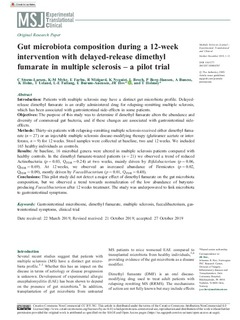| dc.contributor.author | Storm-Larsen, Christopher | |
| dc.contributor.author | Myhr, Kjell-Morten | |
| dc.contributor.author | Farbu, Elisabeth | |
| dc.contributor.author | Midgard, Rune | |
| dc.contributor.author | Nyquist, Kaja Beate | |
| dc.contributor.author | Broch, Line | |
| dc.contributor.author | Berg-Hansen, Pål | |
| dc.contributor.author | Hov, Johannes Espolin Roksund | |
| dc.contributor.author | Holmøy, Trygve | |
| dc.date.accessioned | 2020-02-07T08:03:21Z | |
| dc.date.available | 2020-02-07T08:03:21Z | |
| dc.date.created | 2020-02-03T13:30:21Z | |
| dc.date.issued | 2019 | |
| dc.identifier.citation | Multiple Sclerosis Journal, Experimental, Translational and Clinical. 2019, 1-13 | nb_NO |
| dc.identifier.issn | 2055-2173 | |
| dc.identifier.uri | http://hdl.handle.net/11250/2640141 | |
| dc.description.abstract | Introduction
Patients with multiple sclerosis may have a distinct gut microbiota profile. Delayed-release dimethyl fumarate is an orally administered drug for relapsing–remitting multiple sclerosis, which has been associated with gastrointestinal side-effects in some patients.
Objectives
The purpose of this study was to determine if dimethyl fumarate alters the abundance and diversity of commensal gut bacteria, and if these changes are associated with gastrointestinal side-effects.
Methods
Thirty-six patients with relapsing–remitting multiple sclerosis received either dimethyl fumarate (n = 27) or an injectable multiple sclerosis disease-modifying therapy (glatiramer acetate or interferons, n = 9) for 12 weeks. Stool samples were collected at baseline, two and 12 weeks. We included 165 healthy individuals as controls.
Results
At baseline, 16 microbial genera were altered in multiple sclerosis patients compared with healthy controls. In the dimethyl fumarate-treated patients (n = 21) we observed a trend of reduced Actinobacteria (p = 0.03, QFDR = 0.24) at two weeks, mainly driven by Bifidobacterium (p = 0.06, QFDR = 0.69). At 12 weeks, we observed an increased abundance of Firmicutes (p = 0.02, QFDR = 0.09), mostly driven by Faecalibacterium (p = 0.01, QFDR = 0.48).
Conclusions
This pilot study did not detect a major effect of dimethyl fumarate on the gut microbiota composition, but we observed a trend towards normalization of the low abundance of butyrate-producing Faecalibacterium after 12 weeks treatment. The study was underpowered to link microbiota to gastrointestinal symptoms. | nb_NO |
| dc.language.iso | eng | nb_NO |
| dc.publisher | Sage Publications | nb_NO |
| dc.rights | Navngivelse-Ikkekommersiell 4.0 Internasjonal | * |
| dc.rights.uri | http://creativecommons.org/licenses/by-nc/4.0/deed.no | * |
| dc.title | Gut microbiota composition during a 12-week intervention with delayed-release dimethyl fumarate in multiple sclerosis – a pilot trial | nb_NO |
| dc.type | Journal article | nb_NO |
| dc.type | Peer reviewed | nb_NO |
| dc.description.version | publishedVersion | nb_NO |
| dc.source.pagenumber | 1-13 | nb_NO |
| dc.source.journal | Multiple Sclerosis Journal, Experimental, Translational and Clinical | nb_NO |
| dc.identifier.doi | 10.1177/2055217319888767 | |
| dc.identifier.cristin | 1790210 | |
| dc.description.localcode | This article is available under the Creative Commons CC-BY-NC license and permits non-commercial use, distribution and reproduction in any medium, provided the original work is properly cited. | nb_NO |
| cristin.unitcode | 194,65,1,0 | |
| cristin.unitname | MH fakultetsadministrasjon | |
| cristin.ispublished | true | |
| cristin.fulltext | original | |
| cristin.qualitycode | 1 | |

